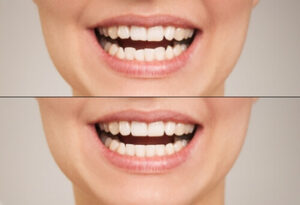In the ever-evolving cosmetic dentistry, veneers have become a popular solution for those seeking a flawless smile. However, not all teeth veneers are created equal. The distinction between bad and good veneers can make or break your journey to that perfect smile. With a multitude of factors to consider, from the type of veneers to the expertise of your dentist, it’s essential to be well-informed before embarking on this transformative procedure.
Understanding Dental Veneers: A Brief Overview
Dental veneers are thin layers of material bonded to the front surface of your natural teeth to enhance their appearance. They can address various dental issues, including crooked teeth, tooth decay, and an overall desire for a more aesthetic smile. Veneers with unique properties and benefits may be made from porcelain, composite resin, or ceramic materials. Ceramic veneers, in particular, are known for their affordability and durability, making them a favourable choice among patients.
Porcelain Veneers vs Composite Veneers

On the other hand, composite veneers are made from tooth-coloured resin. While they are generally less expensive than porcelain veneers, they may offer different longevity or aesthetic appeal. Composite veneers can be an optimal choice for minor corrections or temporary veneers before opting for a more permanent solution.
The Hallmarks of Good Veneers
Good veneers are characterised by their ability to boost your smile while maintaining a natural appearance. Achieving this delicate balance requires the skill and artistry of an experienced dentist. Here are some key factors that distinguish good veneers from their subpar counterparts:
Natural Tooth Structure Preservation
A crucial aspect of good veneers is preserving your natural tooth structure. An experienced dentist will meticulously prepare your teeth, removing only minimal enamel. This approach not only protects your natural teeth but also contributes to the longevity of your veneers.
Long-Term Durability
The best dental veneers are crafted from high-quality materials such as porcelain or ceramic. These materials are favoured for their durability, resistance to wear and tear, and ability to replicate the natural translucency of real teeth. High-quality materials ensure that your veneers will withstand the test of time, providing you with a lasting, healthy smile.
Minimal Tooth Sensitivity
High-quality veneers should result in minimal tooth sensitivity post-procedure. Proper bonding techniques and careful enamel removal help in reducing sensitivity, ensuring that you can enjoy your new smile without discomfort.
Aesthetic Harmony
Good veneers should create aesthetic harmony with the rest of your facial features. This means considering factors such as the shape and size of your teeth, your bite, and your overall facial structure to ensure a cohesive and balanced appearance.
Natural Colour Matching
One of the critical aspects of good veneers is their ability to match the natural colour of your teeth. This involves careful selection and blending of shades to ensure the veneers look indistinguishable from your natural teeth. A perfect colour match is crucial for a harmonious and natural-looking smile.
Proper Fit and Alignment
Good veneers are custom-made to fit your teeth perfectly. This precise fit ensures that the veneers are comfortable, functional, and aesthetically pleasing. Proper alignment is essential for the appearance of your smile, maintaining good oral health, and preventing bite problems.
The Pitfalls of Bad Veneers
Bad veneers can be a dental nightmare, leading to various issues affecting your oral health and overall satisfaction with the final result. Here are some common problems associated with bad veneers:
Unnatural Appearance
One of the most noticeable signs of bad veneers is an unnatural appearance. This can result from improper colour matching, poor craftsmanship, or low-quality materials. Veneers that are too opaque, white, or poorly shaped can stand out against your natural teeth, detracting from your smile’s overall harmony.
Tooth Sensitivity
Improperly placed veneers can cause tooth sensitivity, especially if too much enamel is removed during preparation. This sensitivity can make eating and drinking less comfortable, diminishing your quality of life.
Poor Fit and Alignment
Bad veneers may not fit properly, leading to discomfort, difficulty chewing, and even damage to your natural teeth. A poor fit can also contribute to gum irritation and inflammation, compromising oral health.
Increased Risk of Tooth Decay
If veneers are not bonded correctly, they can create spaces where bacteria accumulate, leading to tooth decay and gum disease. This risk is particularly high with low-quality materials and inexperienced dentists who may not follow proper procedures.
The Transformation Process: From Consultation to Completion
Embarking on the journey to obtain teeth veneers involves steps designed to ensure the best possible outcome. Understanding this process can help set practical expectations and ease anxieties about the procedure.
Initial Consultation

Treatment Planning
A detailed treatment plan is developed once you and your dentist decide on veneers. This plan includes the type of veneers best suited to your needs—porcelain, composite, or ceramic veneers—and a timeline for the procedure. Your dentist will also discuss necessary preliminary treatments, such as addressing dental issues like tooth decay or gum disease.
Tooth Preparation
The next step includes preparing your teeth for the veneers. This process typically includes removing a thin layer of enamel from the front surface of your teeth to create space for the veneers. This ensures a natural fit and appearance. Temporary veneers may be placed during this stage to shield your teeth while your customised veneers are fabricated.
Veneer Fabrication
High-quality veneers are custom-made to match your natural teeth’ shape, size, and colour. This fabrication process can take several weeks, depending on the type of veneers and the complexity of your case. Your dentist will work closely with a dental laboratory to ensure that your veneers meet the highest standards of quality and aesthetics.
Veneer Placement
Once your custom veneers are ready, the final step is their placement. This involves carefully bonding the veneers to your teeth using a strong dental adhesive. Your dentist will make the needed adjustments to ensure a perfect fit and alignment. This meticulous attention to detail is crucial for attaining a natural-looking smile and maintaining optimal oral health.
The Role of the Dentist
Selecting the right dentist is arguably the most important step in achieving your ideal smile. A seasoned dentist will boast a history of successful veneer placements, a comprehensive grasp of the intricacies of creating natural-looking veneers, and the ability to set practical expectations. Reviewing patient testimonials and examining before-and-after photos can offer essential insights into the dentist’s skill and the calibre of their work.
Avoiding Inexperienced Dentists
An inexperienced dentist may lack the skills necessary to produce high-quality veneers. The consequences of poorly executed veneers can be costly in terms of money and dental health. It’s essential to research and select a dentist with extensive experience in cosmetic dentistry to ensure the best possible outcome.
Maintaining Your Veneers: Good Oral Hygiene and Proper Care
Once you’ve achieved your dream smile with good veneers, maintaining them is crucial. Practise good oral hygiene by brushing and flossing regularly to keep your veneers and natural teeth in optimal condition. Regular check-ups with your dentist will help monitor the health of your veneers and address any issues promptly.
Protecting Your Veneers
Veneers are durable, but they are not indestructible. Avoid biting into hard foods, and be cautious if you play contact sports, as these activities can damage your veneers. Wearing a mouthguard during sports can provide additional protection.
Regular Maintenance
Veneers may need to be replaced over time due to natural wear and tear. Regular dental visits will help your dentist evaluate the condition of your veneers and recommend any necessary replacements to maintain your smile’s integrity.
Making an Informed Decision
Choosing to get teeth veneers is a significant decision that needs careful consideration of multiple factors, including cost considerations, the expertise of your dentist, and the quality of materials used. By understanding the differences between bad veneers and good veneers, you can make an informed decision that will improve your smile and your overall dental health.
Final Thoughts
In cosmetic dentistry, veneers offer a transformative solution for those seeking a natural-looking smile. However, this procedure’s success hinges on your dentist’s expertise and the quality of the materials used. By prioritising these factors, you can achieve a healthy, beautiful smile that endures the test of time. Remember, good veneers enhance your appearance and contribute to your oral health and well-being. So, take the time to research, consult with experienced dentists, and make an informed decision to ensure the best possible outcome for your smile.
If you’re considering veneers, contact Dental 266 at 02 9051 0600. Our skilled team is ready to help you achieve the perfect smile you deserve.
References:
Mayo Clinic. (n.d.). Cavities/tooth decay. Mayo Clinic. Retrieved from https://www.mayoclinic.org/diseases-conditions/cavities/symptoms-causes/syc-20352892
Dentistry Today. (n.d.). What are dental veneers? Dentistry Today. Retrieved from https://www.dentistrytoday.com/sp-852398118/
Fondriest, J. (2015). The optical characteristics of natural teeth. ResearchGate. Retrieved from https://www.researchgate.net/profile/James-Fondriest/publication/282010120_The_Optical_Characteristics_of_Natural_Teeth/links/5601582108aec948c4faa85e/The-Optical-Characteristics-of-Natural-Teeth.pdf







